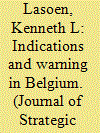|
|
|
Sort Order |
|
|
|
Items / Page
|
|
|
|
|
|
|
| Srl | Item |
| 1 |
ID:
156670


|
|
|
|
|
| Summary/Abstract |
The terrorist attacks in France and Belgium of 2015–2016 that occurred while these countries were in a heightened state of alert raise questions about indications and warning methodology as well as effectiveness of the blanket-protection deployment of security services assisted even by the military. Response and perhaps even more anticipation may require strategic rethinking in light of the predatory attacks that target the most vulnerable spots of the public space. This study looks at threat analysis in Belgium as conducted through her intelligence fusion centre Coordination Unit for Threat Analysis (CUTA) since its inception in 2006. With a special focus on what is known, at the time of writing, about the terrorist attacks in Paris and Brussels, this study hopes to put into context how the system (mal)functions and will also consider the preventive measures that respond to the threat, and the international aspects which have implications far beyond Belgian borders. Therefore, a case is made for not just a Belgian homeland security framework, but one that fits into an EU-wide security concept.
|
|
|
|
|
|
|
|
|
|
|
|
|
|
|
|
| 2 |
ID:
110083


|
|
|
|
|
| Publication |
2011.
|
| Summary/Abstract |
The modern Olympic Games are large and complex enough to be termed 'mega events'. They use enormous resources; human, physical and financial. The effects of such investments are significant and long-lived for the host country; both urban infrastructure and security measures must be meticulously planned to ensure the event's success. In the case of London 2012, there was less than 24 hours between the announcement that London would be the host, and the tragic events of the July bombings, meaning that Britain's Olympic Games would forever be inextricably linked with terrorism. This paper examines whether the forthcoming Olympic Games has been used as an opportunity to ensure that Britain's maritime flank is as well protected as it can be. It will ask whether there is a credible threat to the UK from the maritime domain, both during the event, and once it has finished. It will look at how the Government views the issue of defence of our homeland waters from threats, what work has been done to mitigate risks to the Olympics, and whether, once the closing ceremony has finished, the unique opportunities offered by the hosting of such event has made us safer. It will conclude that there is a credible threat of attack on the UK's way of life, either at, or from the sea, but despite this, the Government is taking a strategic risk in relying on the maritime environment to deliver over 90 per cent of our trade. Not only that, the Government has directed that security for the Olympics will be based on 'business as usual', and so the hosting of the largest event on the planet has potentially been a missed opportunity to focus on strengthening our security structures. Current Government Foreign and Defence Policies provide little opportunity for re-visiting our homeland security strategy, despite predictions of security requirements to preserve our way of life becoming future defence priorities. In this era of fiscal strain, ever fewer assets and capabilities, and our reliance on the sea for our very survival, the homeland maritime domain has never looked so vulnerable.
|
|
|
|
|
|
|
|
|
|
|
|
|
|
|
|
|
|
|
|
|